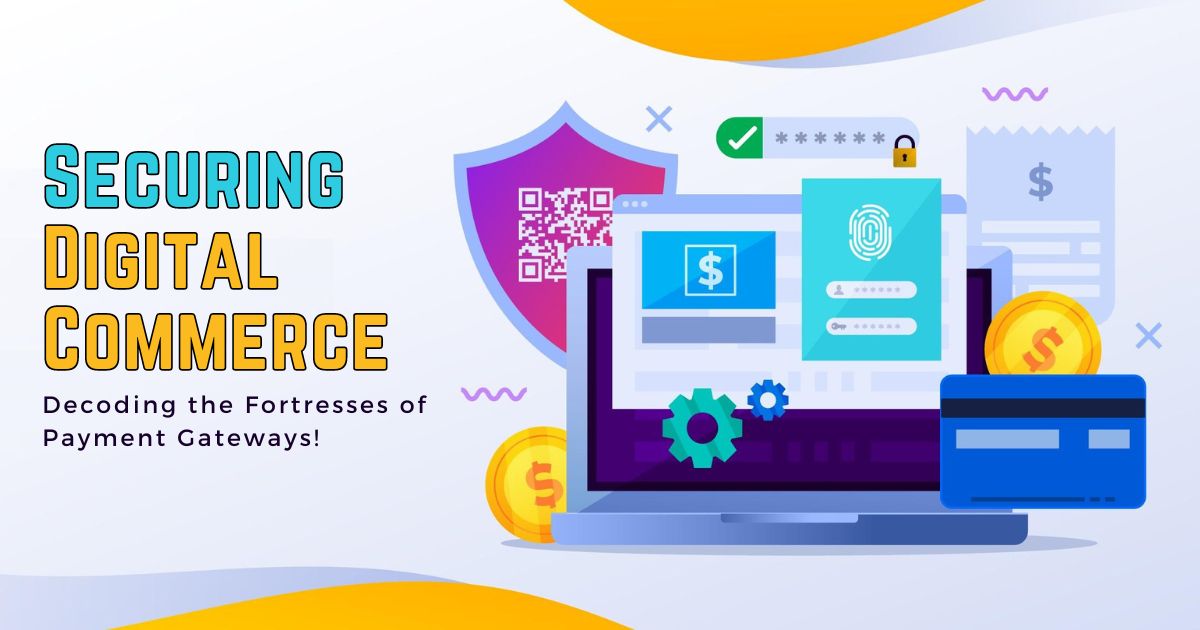
| December 29th, 2023 |
Securing Digital Commerce — Decoding the Fortresses of Payment Gateways!
In the dynamic realm of online transactions, where convenience meets commerce, the role of payment gateways is pivotal. As technology advances, so do the methods employed by cyber threats. Ensuring the security of online transactions has become a paramount concern for businesses and consumers alike. In this blog post, we delve into the world of payment gateways, unraveling the sophisticated measures that safeguard digital transactions and fortify the foundations of e-commerce.
Introduction —
The landscape of commerce has shifted significantly with the rise of e-commerce platforms. Digital transactions have become the norm, prompting the need for robust security measures. Payment gateways have emerged as the guardians of these transactions, facilitating secure monetary exchanges over the Internet.
Anatomy of Payment Gateways —
Gateway Encryption Protocols:
Payment gateways employ state-of-the-art encryption protocols to shield sensitive information. Advanced Encryption Standard (AES) and Transport Layer Security (TLS) are the bedrock of secure data transmission, rendering intercepted data practically indecipherable to unauthorized entities.
Tokenization – Rendering Data Impenetrable:
Tokenization adds an extra layer of security by replacing sensitive data with non-sensitive equivalents, known as tokens. Even if intercepted, these tokens are meaningless to attackers, as the real data is stored in secure vaults maintained by the payment gateway.
Multi-Factor Authentication (MFA) —
Multi-factor authentication adds a layer of protection by requiring users to provide multiple forms of identification. This could include something the user knows (password), something the user has (mobile device), or something the user is (biometric data). MFA ensures that even if login credentials are compromised, unauthorized access remains a formidable challenge.
Fraud Detection and Prevention —
Machine Learning Algorithms:
Payment gateways leverage machine learning algorithms to analyze transaction patterns and detect anomalies. By continuously learning and adapting, these algorithms can identify suspicious activities in real time, preventing fraudulent transactions before they occur.
Geo-Location Tracking:
Tracking the geographical location of users aids in identifying potentially fraudulent transactions. Unusual patterns, such as transactions from different continents within a short time frame, trigger alerts, prompting further scrutiny.
Regulatory Compliance —
PCI DSS Compliance:
Payment Card Industry Data Security Standard (PCI DSS) compliance is a non-negotiable aspect of payment gateways. Adhering to PCI DSS standards ensures that sensitive cardholder data is handled securely, reducing the risk of data breaches and ensuring a uniform level of security across the industry.
GDPR and Data Protection:
General Data Protection Regulation (GDPR) compliance is imperative to protect user privacy. Payment gateways meticulously handle personal data, ensuring transparency, and giving users control over their information. Compliance with GDPR reinforces the commitment to data protection.
Continuous Monitoring and Incident Response —
Real-time Monitoring:
Payment gateways employ real-time monitoring to detect and respond swiftly to security incidents. Any deviation from normal transaction patterns triggers alerts, enabling immediate intervention to mitigate potential threats.
Incident Response Protocols:
Having robust incident response protocols in place is essential. In the event of a security breach, a well-defined plan ensures that the impact is minimized, and recovery processes are initiated promptly.
Collaborative Efforts — Merchant and Gateway Partnership:
Secure Integration Practices:
Merchants play a crucial role in maintaining the integrity of online transactions. Collaborating closely with payment gateways, merchants ensure secure integration practices, safeguarding both their customers and reputation.
Regular Security Audits:
Regular security audits, conducted by both merchants and payment gateways, help identify vulnerabilities and ensure that security measures are up to date. This collaborative effort creates a resilient ecosystem against emerging threats.
Conclusion —
In the ever-evolving landscape of online transactions, payment gateways stand as formidable guardians, implementing a multi-faceted approach to secure digital commerce. From encryption and tokenization to advanced fraud detection algorithms, the layers of protection woven into payment gateways form an impregnable fortress against cyber threats. As businesses and consumers continue to embrace the digital frontier, the commitment to enhancing and adapting security measures remains paramount. Through collaborative efforts, stringent compliance, and technological innovations, payment gateways pave the way for a secure and trustworthy digital commerce experience.
In conclusion, the synergy between merchants and payment gateways, fortified by robust security protocols and continuous vigilance, is the cornerstone of a resilient defense against the evolving landscape of cyber threats. As we navigate the digital age, the fortresses of payment gateways ensure that the realm of online transactions remains a secure haven for commerce to thrive.
